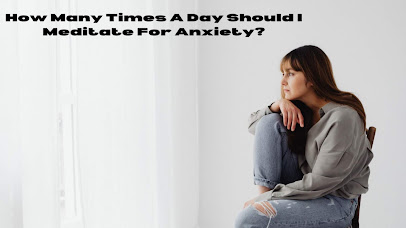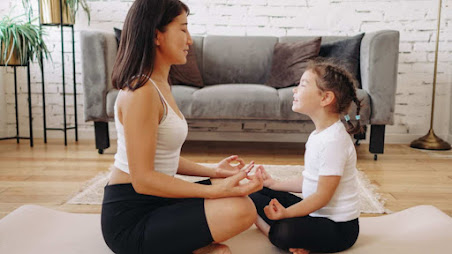Can Meditation Help With Anxiety
Did you already know that over 40 million adults
in the United States are battling with anxiety? Amid this astounding statistic,
Diverse stress management strategies have come
to light, but few are as enduring and on hand as Meditation.
Meditation for beginners isn't always about
immediate enlightenment; it is a sluggish procedure of locating anxiety
alleviation via willpower and exercise.
I've observed how incorporating Meditation into
my daily routine has opened the doors to an extra serene and balanced life.
As we challenge the world of mindfulness
meditation, I propose a beginner's guide that unveils the transformative
capability of this historical practice for contemporary-day stressors.
Let's embark on this journey to mental clarity
and build the foundational steps that could significantly support your mental
health.
Overwhelmed by the never-ending modern-day
thoughts, I determined myself caught in a tension, a chronic and regularly
invisible adversary.
My mental fitness stood on a precipice,
teetering between sanity and an unchartered abyss. Was there a manner out?
Could I find a lengthy-lasting anxiety remedy
and regain manipulation of my thoughts? Like a lighthouse cutting through the
gloom,
I stumbled upon the ancient exercise of
Meditation— a beacon of hope promising the benefits of anxiety discount,
intellectual clarity, and emotional stability.
Subscribing to mindfulness and incorporating
calming sports, I embarked on a private experience of transformation, driven by
an innate desire to explore the electricity of the thoughts over matter.
Back to the query: Can Meditation Help With
Anxiety?
For my pleasure, I will say yes! Because
Meditation may want to serve as an opportunity for treatment for anxiety.
Regular meditation practices provide
intellectual fitness benefits consisting of anxiety remedies and emotional
stability.
Mindfulness, a shape of Meditation, is a
powerful technique for regaining control over one's mind.
Calming sporting activities promoting mental
clarity are imperative to the meditation method.
Incorporating Meditation into daily routine aids
in anxiety discount and fosters mental resilience.
Understanding Anxiety and Its Impact on Daily
Life
When we talk of anxiety, it is essential to make
clear that it comprises more than the informal pressure or fear most of us
experience in our day-to-day lifestyles. Often misunderstood, tension
profoundly extends to our expert, social, and personal spheres.
Understanding Meditation and Its Benefits for Anxiety
Relief
For many of us handling the ebb and waft of each
day's stressors, the artwork of Meditation has grown to be a crucial sanctuary
for mental tranquility.
Let's unpack what Meditation indeed includes. At
its essence, Meditation is a series of practices designed to sell heightened
cognizance and focused interest.
More than simply a unique approach, it
encompasses many meditation strategies, including mindful respiratory, guided
visualization, or even movement-primarily based practices like yoga or tai chi,
which all aim to foster mindfulness.
I've noticed in my view how these practices can
initiate a profound relaxation response inside the body, countering the
fight-or-flight response that regularly accompanies anxiety.
The connection lies in our biology; Meditation
is shown to reduce anxiety hormones like cortisol, which can have a cascading
impact on decreasing anxiety levels.
Scientific studies have highlighted how normal
Meditation can undoubtedly affect the amygdala, the part of our brain that regulates
emotions, consisting of fear and anxiety.
Through steady exercise, Meditation has the
strength to reshape our neural pathways, making us more resilient to stress.
But do not just take my word for it. The
blessings of Meditation resonate within the anecdotes shared through limitless
individuals.
Stories abound of human beings who've determined
solace in their meditation exercise, mentioning decreased anxiety and a general
sense of calm as they navigate the complexities of their lives.
Whether it's five minutes of deep respiratory or
a longer session of contemplative mirrored image, the effect is tangible and
regularly profound.
To sum up, Meditation is more than a
non-permanent retreat from the whirlwind of life. It's a tool for deep, lasting
anxiety reduction and a pathway to an extra-serene mind.
So, as we explore just how frequently one has to
meditate to quell anxiety, consider that the benefits build with time and can
function as a steadfast ally in our quest for a tranquil coronary heart and mind.
Defining Anxiety: More Than Just Stress
Unlike regular stress that comes and goes,
anxiety disorders persist for extended periods, sometimes without any specific
reason.
The intensity of this persistent worry and fear
is often out of proportion to the situation at hand, causing people with
anxiety disorders undue suffering or impairment in their daily routines.
Statistics: A Look at Anxiety Disorders in the
US
Turning our attention to mental health
statistics, data from the National Institute of Mental Health indicates a
staggering prevalence of anxiety disorders among adults in the United States.
These disorders top the list of common mental health issues, affecting millions and underscoring the necessity for effective interventions and treatments.
How Many Times A Day Should I Meditate For Anxiety?
When it comes to managing anxiety through
Meditation, I've often pondered the optimal meditation frequency that could
offer the most relief.
It turns out that mental health professionals
and seasoned practitioners endorse a range of recommendations, each tailored to
the individual's lifestyle, the intensity of their anxiety, and personal
wellness goals.
Meditating to reduce anxiety doesn't have a
one-size-fits-all schedule. Some experts advocate for multiple short sessions
throughout the day,
Which can seamlessly integrate into even the
busiest schedules. Others suggest a single, more extended session to deeply
relax the mind and reduce stress levels.
In my exploration, the key has been consistency,
with daily practice proving instrumental in achieving long-term benefits.
Begin with a brief morning session to set a
positive tone for the day. Include a midday pause, harnessing a few minutes
for focused breathing to recalibrate.
End the day with a longer period of Meditation
to process and release the day's stress.
Case studies exemplify that individuals adhering
to a meditation schedule with an emphasis on regularity have reported
significant improvements in their ability to manage anxiety.
The meditation duration in these cases varied,
but the common thread was the establishment of a routine that fostered a
greater sense of control over anxious thoughts and feelings.
Tracking progress and mood shifts to tailor the
meditation duration for maximum benefit.
Adapting the meditation schedule to fit into any
lifestyle, whether it's five minutes or fifty.
The American Meditation Society suggests
starting with shorter sessions and gradually increasing the duration as you
become more comfortable with the practice.
There's an emphasis on finding a rhythm that
aligns with your daily life rather than adhering strictly to a prescribed
optimal meditation frequency.
Developing a Sustainable Meditation Routine for
Long-Term Anxiety Control
For those of us on a meditation journey, the
cornerstone of success lies in establishing a meditation habit that prioritizes
consistent practice.
This isn't about devoting hours daily but
embedding a routine that harmonizes with our lives for mental wellness.
Adhering to a fixed time each
day to meditate can be transformative. Whether it's the serenity of dawn or the
quiet of the evening,
Having a scheduled slot for Meditation helps in
cultivating discipline. As I integrated this into my life, I noticed a
significant uptick in my ability to manage stress and reduce anxiety.
Moreover, patience and self-compassion have been
my allies in overcoming hurdles that threaten the regularity of my practice.
In the initial stages, I found it beneficial to
use guided sessions from meditation apps and occasionally joined meditation
groups for collective energy and support.
This sense of community and accessible resources
kept my practice buoyant and allowed me to maintain focus on the long-term
benefits.
It's essential to remember that some days will
be better than others, and that's perfectly okay.
The journey to mental wellness is not a sprint
but a marathon, and every step—no matter how small—makes a difference.
My approach to fostering a personalized
meditation routine has evolved, shining a light on the unique nature of each
individual's path to anxiety control.
Tailoring the practice to fit personal
preferences and life circumstances has made this endeavor not just a habit but
a lifestyle choice that significantly contributes to sustained mental health.
Experts often echo the sentiment that revisiting
and refining our meditation goals periodically is critical in ensuring this
practice remains a dynamic and effective tool in our arsenal against anxiety.
By nurturing a responsive and adaptive
meditation habit, the compound effects on our mental wellness can be profound
and life-affirming.
Scientific Evidence: What Research Says About
Meditation And Anxiety
As we reach the culmination of our exploration
into the intersection of Meditation and anxiety, it is crucial to substantiate
our insights with proven scientific research.
The realm of mental health thrives on an
evidence-based approach, with stakeholders constantly seeking robust results
from clinical trials and comparative case studies.
Throughout this section, we will examine the
output of such research, detailing how meditation techniques function as viable
anxiety treatments in light of these scientific findings.
Reviewing Clinical Studies: Meditation's Effect
on Anxiety Levels
Various studies have illuminated the potential
of Meditation to alter our neural pathways and influence our emotional
responses.
The scientific narratives support the premise
that consistent meditation practices can help lower cortisol levels, thus reducing
the overactive fight-or-flight response prominent in individuals with anxiety
disorders.
Compelling evidence from these clinical trials suggests that embracing Meditation could improve our emotional well-being, rendering it an effective tool for managing anxiety levels.
The Science Behind Anxiety: What Happens In The Brain
To comprehend how anxiety impacts our lives,
it's critical to explore what occurs within the brain during such episodes.
When an anxious situation triggers the body's
fight or flight response, the amygdala - a small almond-shaped part of the
brain that controls emotional processing - gets activated.
This heightened state leads to the release of
hormones like cortisol that prepare the body for immediate action.
However, with chronic stress, this protective
mechanism can backfire, causing consistently elevated cortisol levels and
changes in amygdala function.
Thus, understanding the complexities of anxiety
goes far beyond recognizing its symptoms. It takes delving into our brain chemistry,
the influence of chronic stress, and how heightened cortisol levels can disrupt
our regular amygdala function.
By doing so, we can begin to shed light on the true impact of anxiety disorders on our lives.
What Is Meditation? Exploring Its Historical and Cultural Significance
Chasing back to the origins of human
civilization, Meditation holds an untold ancient wisdom.
The transformative power of Meditation has
significant historical implications, and its rich practice transcends cultural
boundaries, presenting a wholesome solution to the trials of contemporary life.
Meditation in Various Traditions: From Ancient
Practices to Modern Adaptations
Meditation history spans centuries, where it
featured prominently in ancient Eastern religions and philosophies such as
Buddhism and Hinduism.
Zen and Vipassana, integral branches of
Buddhism, highly honor Meditation as a pathway to enlightenment.
Modern meditative practices have adopted and
adapted these traditional techniques, creating diverse variations that cater to
the lifestyles of today's generation.
The Different Types of Meditation Techniques
Each meditation tradition offers unique
techniques that target different aspects of human consciousness.
Mindfulness practice, originating from the
Buddhist tradition, encourages living in the present moment and improving
self-awareness.
On the other hand, Transcendental Meditation,
derived from Hindu teachings, involves the repetition of a mantra to achieve a
state of relaxed awareness.
Guided Meditation employs verbal guidance by an
experienced practitioner to facilitate the meditative process.
Modern adaptations of these practices
incorporate elements such as body scans and breathing exercises, aiding
individuals in maintaining focus and reinforcing mind-body integration.
Proper Meditation Postures and Settings for
Optimal Results
The physical aspect of Meditation is just as
crucial for its effectiveness—the posturing of the body can greatly influence
the quality of the meditative experience.
Conventionally, practitioners ensure a straight
spine and comfortably seated position and often employ aids, such as meditation
cushions for support.
Environmental factors also bear significance, as
a quiet and harmonious setting can enhance focus and calmness of mind.
Ultimately, optimizing meditation postures and
settings is instrumental in bringing the benefits of Meditation into daily
life.
Meditation As A Tool For Anxiety Relief
I've spent extensive time examining how
Meditation can be targeted and consistently engaged as a true champion in the
quest to manage anxiety.
The wisdom gleaned from renowned mental health
professionals, practitioners of cognitive behavioral therapy,
And those individuals who've found sanctuary in
its practices have been invaluable. Let's begin our exploration of the power and
versatility this approach brings.
At the core of Meditation's ability to combat
anxiety is its influence on stress management.
By promoting a state of relaxed alertness,
Meditation can absorb and dissolve the blocks of stress that accumulate in our
minds throughout a typical day.
The advantage conferred by these relaxation
techniques is bolstered by their remarkable capacity to assist with emotional
regulation.
Meditation can nurture an intimate understanding
of your emotional landscape, facilitating greater control over the ebbs and
flows of your internal world.
This mastery over one's emotions is not just
about control; it is about fostering mental resilience.
Meditation encourages us to see our thoughts and
emotions as transient, if intense, phenomena. Anxiety may raise a storm, but
like all storms, it will pass. This mindful perspective can imbue us with
profound strength.
Moreover, these effects combine to form a
powerful set of coping strategies.
These can be drawn upon during different stages
of an anxiety cycle to alleviate emotional distress, reduce the severity and
length of an anxiety attack, or manage residual stress.
With practice, these techniques can be tailored
and optimized for each individual, creating a uniquely personal handling
toolkit.
The techniques used in Meditation allow for
dynamic stress release.
Meditation nurtures higher emotional regulation
and self-awareness.
Through consistent practice, Meditation can
boost mental resilience.
The practice can come together to form a
tailorable coping mechanism for individuals with anxiety.
Following a daily meditation practice can unveil
the full extent of these benefits. The process of Meditation, like any other
skill, achieves its finest form with regular practice.
A tranquil start or close to a day, a moment of
serenity amidst the chaos, a tool against incipient worry spirals – such are
the benefits awaiting those who make Meditation an integral part of their
lives.
In essence, Meditation, when approached with
diligence and patience, can be a transformative tool for anyone battling
anxiety.
It promotes proactive and reactive conflict management leveraged from within, empowering individuals to lead fuller, healthier lives.
The Role Of Mindfulness Meditation In Managing Anxiety Disorders
Now, when we zoom in on the myriad techniques in
the meditation spectrum, Mindfulness-Based Stress Reduction (MBSR) emerges as a
particularly potent method for managing anxiety disorders.
MBSR programs have been observed to generate a
positive ripple effect across various domains of life, strengthening the sense
of self-control and resilience against anxiety triggers.
Comparing Meditation with Other Anxiety
Reduction Techniques
Although traditional anxiety reduction methods,
including medication and psychotherapy, have proven effective, studies suggest
that Meditation could serve as an excellent complementary practice or even an
alternative for some.
Comparisons based on parameters like
effectiveness, accessibility, and side effects have placed Meditation as a
viable strategy in the context of mental health care.
It bears mentioning that such findings underscore the importance of personalized treatments for anxiety – a one-size-fits-all approach is rarely the answer.
How Do I Start Meditating For Anxiety?
Embarking on a meditation journey calls for more
than just intent; it necessitates the established order of a steady meditation
habit.
It's about making Meditation a non-negotiable
thing of your day, similar to brushing your teeth. By doing so, you construct
an addiction loop, wherein Meditation will become 2nd nature.
Environment plays an important function in
cultivating a protracted-time period mindfulness exercise.
In my very own revel in, I've crafted a tranquil
nook dedicated to Meditation, loose from distractions and ready with
comfortable cushions.
It's this private sanctuary that beckons me,
almost like a visible reminder to pause and engage in my day-by-day exercise.
Sometimes, I lean on guided meditation resources
to steer the way, in particular at some stage in days, while concentrating
looks as if an exhausting mission.
These guided sessions can streamline the
procedure, supplying direction and structure to assist in navigating via intellectual
litter.
Addressing not unusual hindrances head-on has
taught me valuable classes in sustaining a meditation exercise.
Time constraints often pose the finest project. However, I have discovered that even quick durations of Meditation are
beneficial.
Moreover, to keep my motivation alive, I
replicate the palpable anxiety remedy strategies meditation presents me—the
ones moments of deep respiration that wash away the anxiety and instill an
experience of calm.
I inspire you to be an affected person and type to
yourself as you embark on this path. Over time, these small, deliberate steps
will result in profound adjustments in managing anxiety and bolstering your
mental health.
Conclusion:
This article content explores the efficacy of
Meditation in assuaging anxiety, a condition affecting millions in the United
States.
Meditation is depicted as a gradual process
presenting comfort through area and exercise. Personal reports highlight its
transformative capability, promoting a serene and balanced existence.
This article offers insights into the history
and various strategies of Meditation, emphasizing its capability to reduce
anxiety by way of promoting relaxation and emotional regulation.
Recommendations for integrating Meditation into
everyday exercises are provided, emphasizing consistency for long-term
advantages.
Scientific studies support Meditation's
efficacy in changing neural pathways and reducing cortisol stages, which is important in
handling tension.
Mindfulness-Based Stress Reduction (MBSR) is
highlighted as a robust approach to tension control.
Comparison with traditional treatments
underscores Meditation's capability as a complementary or opportunity approach.
Practical recommendation is given for beginning
and maintaining a meditation exercise, emphasizing a routine environment, and
addressing unusual limitations.
Overall, Meditation is portrayed as an effective device for cultivating mental resilience and dealing with tension, promoting holistic well-being.






